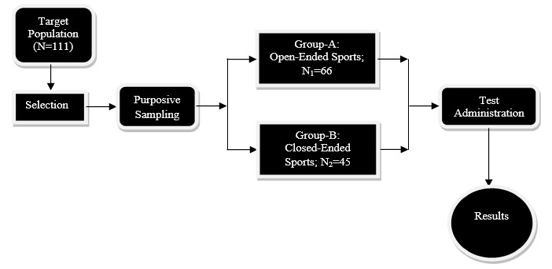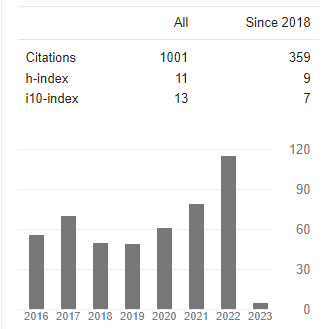APPRAISE THE DISTINCTIONS IN MENTAL SKILLS AMONG ATHLETES ENGAGED IN OPEN-ENDED VERSUS CLOSED-ENDED SKILLS: A CROSS-SECTIONAL PROBE
Abstract
Study Aim: Aim of this study was to find out the differences of Mental Skills among athletes engaged in Open-Ended versus Closed-Ended Skills sports. Material and Methods: A total of one hundred one male participants (N=111), aged between 18 and 25, from universities located in the northern state of Indian, took part in the study. Furthermore, these participants were categorized into the following groups. Group-A: [Open-Ended Sports; N1=66]and Group-B: [Closed-Ended Sports; N2=45]. The Mental Skills Questionnaire developed by Hardy and Nelson (1996) is intended for gathering data on the mental skills engaged in Open-Ended versus Closed-Ended Skills sports.
2 Statistical Techniques: A comparison of the two means was carried out using an unpaired 't'-test. All calculations and statistical analyses were performed utilizing SPSS 27. The threshold for significance in hypothesis testing was established at 0.05.
Results: Results revealed that the means are not significantly different at p <0.05 with regards to variable mental skills (0.2846<1.984) (viz., Imagery Ability; 0.2999<1.984, Mental Preparation; 0.4638<1.984, Self Confidence; 0.2036<1.984, Anxiety and Worry Management; 0.0715<1.984, Concentration Ability; 0.8367<1.984 and Relaxation Ability; 0.6651<1.984.
Downloads
References
Adeyeye, M., Edward. Kehinde, A., Afolabi, F. (2013). Effects of MentalSkills Training On the Performance of Table Tennis Players of National Institute for Sport, Lagos. Journal of Research & Method in Education,3(2),22-27.
Durand-Bush, N., Salmela, J.H., & Green-Demers, I. (2001). The Ottawa mental skills assessment tool (OMSAT-3). The sport psychologist, 15(1), 1-19.
Gholamhossinzadeheghlidi, L., Bahari, M., & Shirazi, M. (2016). The relationship of psychological skills and performance of skilled men volleyball
players in vulnerable situations of competition. Research journal of sport
sciences, 4(1), 1-9.
Gould, D., & Maynard, I. (2009). Psychological preparation for the Olympic
Games. Journal of sports sciences, 27(13), 1393-1408.
Gucciardi, D. F., Hanton, S., Gordon, S., Mallett, C. J., & Temby, P. (2015).
The concept of mental toughness: Tests of dimensionality, nomological
network, and traitness. Journal of personality, 83(1), 26-44.
Jones, G., Hanton, S., & Connaughton, D. (2002). What is this thing called
mental toughness? An investigation of elite sport performers. Journal of applied
sport psychology, 14(3), 205-218.
Jones, G., Hanton, S., & Connaughton, D. (2007). A framework of mental
toughness in the world’s best performers. The sport psychologist, 21(2), 243-
Katsikas, C. A.P., & Smirniotou, A. (2009). Performance strategies of Greek
track and field athletes: Gender and level differences. Biology of exercise, 5(1),
-38.
Kumar, V., & Choudhary, C. (2020) Mental skills a systematic review.
IJEMS. 09(04), 14-20.
Orlick, T., & Partington, J. (1988). Mental links to excellence. The sport
psychologist, 2(2), 105-30.
Sharma, D. (2018). A comparative study on mental skills of team players
and individual game players at inter college level. International Journal of
Yogic, Human Movement and Sports Sciences, 3(1), 540-541.
Sisodiya, A.S., & Arora, D. (2023). Comparative study of psychological
skills of individual and team sports persons. Journal of Sports Science and
Nutrition, 4(2), 167-169.
Vealey, R. S. (1988). Future directions in psychological skills training. The
sport psychologist, 2(4), 318-336.

Copyright (c) 2025 Mahima Sharma, Nishan Singh Deol, Baljinder Singh Bal

This work is licensed under a Creative Commons Attribution 4.0 International License.














